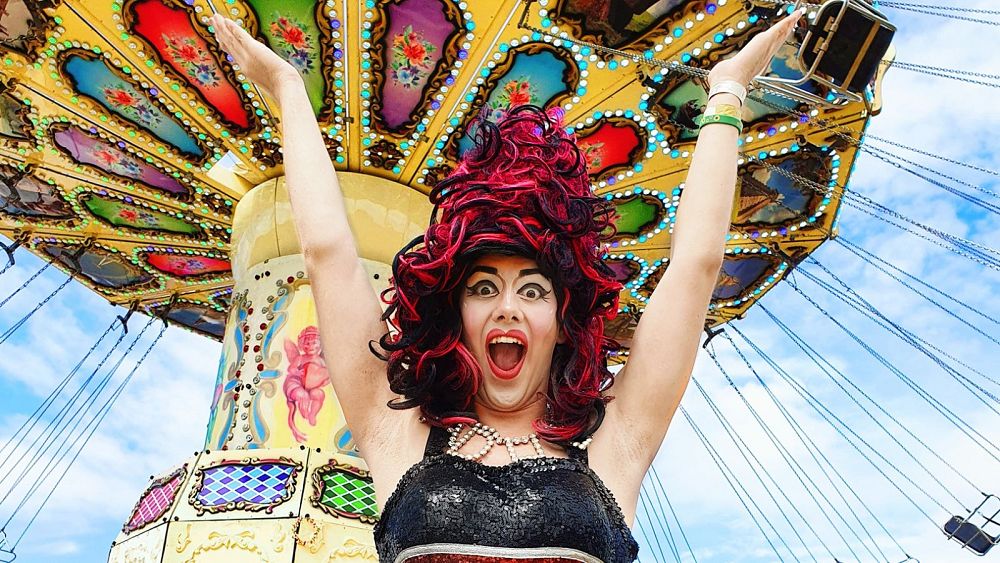
Drag shows have become the latest battlefield in America’s so-called ‘culture wars’, as conservatives in the country push to restrict performances where children might be in attendance, including family-friendly reading events like Drag Story Hour.
Last month, Tennessee became the first US state to ban drag performances within its territory with a law that prohibits “adult and cabaret performances” in public or in the presence of children. The law specifically targets “male or female impersonators”.
But while European media gasp at what’s happening in the US, the debate over drag shows has spread across the old continent as well. Just like America, Europe is divided on drag culture and its influence on children, where Drag Story Hour has come in the crossfire of conservative anti-LGBTQ+ pushes.
The ‘war’ on Drag Story Hour in Europe
Welsh drag artist Aida H Dee — the first drag performer to read stories to kids in a British library — received several death threats last summer while they were touring 70 libraries across the UK with her Drag Queen Story Hour UK events.
Aida, aka Sab Samuel — who has won several awards in recognition of her role in promoting the love for literature among children — was repeatedly subject to harassment from a small number of protestors who tried to disrupt her reading events in the hope they would get cancelled.
Luckily, Aida H Dee’s fans outnumbered the protestors, but similar disruptions and threats led to the cancellation of children’s storytime events hosted by drag artists in Scotland and Finland last year.

In December, a Drag Queen Storytime event in Dundee, Scotland, was cancelled after the drag artist and arts centre’s staff hosting the reading were subject to harassment and abusive threats. In Finland, last July, police had to intervene to remove protesters trying to disrupt a storytime event hosted by a drag queen for children aged six to 10 at the Oodi Central Library in Helsinki.
Far-right protesters claimed they were demonstrating against “grooming” — a term which is now widely recognised as an anti-LGBTQ+ slur when used in this context.
Dragged into the ‘grooming’ conspiracy theory
Aida H Dee said that most of the protesters who showed up at their events last year didn’t really seem to know why they were there — or that at least they were strongly misinformed.
“When asked by journalists, some of them said that we were performing a sex show for kids,” Aida said.
“These people are victims. These aggressors are victims of misinformation campaigns. And we really need to discuss what we can do to prevent misinformation campaigns from getting to these people.”
While those claiming drag shows endanger kids often compare these performances to cabaret and burlesque, drag shows do not inherently involve explicit nudity, and they don’t contain explicit sexual references in the case of storytime events where children are in the audience.
On the other hand, storytime events like Drag Queen Story Hour focus on inclusiveness, education, and representation of marginalised groups.
But this truth is often lost in the rhetoric circulating among conservative circles, despite the fact that drag has entered the cultural mainstream over the past decade — thanks in large part to shows like RuPaul’s Drag Race, or HBO’s We’re Here.
Drag Queen Story Hour events, which started in San Francisco in 2015, have also been spreading across the US — and Europe — since then.
And yet, Aida H Dee, a harsh critic of the Tennessee anti-drag show law, described the current situation facing LGBT+ entertainers like being “at war.”
“As an LGBT children’s entertainer, I constantly feel I’m on an annual review. I constantly feel like everything that I do is being snickered at, where I have to ensure that everything I do is constantly and always perfect and that any type of single slip-up would somehow ruin everything that I’ve ever achieved or worked for.”

Could drag show bans ever come to Europe?
Aida H Dee said that Drag Queen Story Hour UK is preparing for a scenario where a similar law like the Tennessee one — though likely not as vague in its wording — is passed in the UK.
“We have been telling everybody this has been coming on for years,” they said. “And people have said to me, ‘Oh, no, you got your rights, you’ve got your marriage.’ But we said, ‘No, I don’t think you realise that we don’t have respect. We have people constantly attacking us’.”
In at least one European country, drag artists are already forbidden from hosting children’s storytime events. In Hungary, a law passed by Viktor Orbán’s government in June 2021 strengthened rules against paedophilia and banned the dissemination of content in schools deemed to promote homosexuality and gender reassignment.
It states that drag shows can only start after 10pm, with no children in attendance.
But Dr Tim Squirrell from the Institute for Strategic Dialogue — a London-based think tank specialised in research and policy advice on hate, extremism, and disinformation — believes that a similar ban to the Tennessee one is unlikely to be enforced in the UK.
“The US has a far more substantial and vocal reactionary base who’s willing to protest and also to vote for people who will outlaw various kinds of queer expression,” he said.
“The UK obviously has a substantial amount of transphobia in mainstream discourse in politics, but the protests against drag queens, in particular, haven’t taken off that much outside of the far right and the conspiracy theory sector,” he told Euronews.
That’s in part because the UK – and the rest of Europe – just doesn’t have that same level of organised, radical or far right the US has, Squirrell said.
“Turning Point UK [the British offshoot of the US group promoting conservative values in schools] is a tiny, tiny force, it has never taken off the same way it did in the US. […] In the UK they’re kind of a laughing stock.”

Conservative attacks on LGBTQ+ rights in Europe are also being fought on different grounds.
“In the US, the thing that has really taken off is the idea that queer people as such, just being queer, pose a threat to children, and that has a much broader base than in the UK because they really have a substantial core of homophobia in a large proportion of society which has never really gone away,” Squirrell said.
In the UK, on the other hand, “there’s a tradition of things like pantomime and drag that is not sexualised, and I think that has something of a protective effect against people being able to demonise queer people or queer representation.”
In Europe and the UK, Squirrell explained, the debate around LGBTQ+ rights has focused on the trans community and the protection of women’s spaces.
“There is definitely a transnational network of ultra-conservative organisations working to roll back the rights of women and sexual minorities across Europe,” Squirrell said.
“It’s a coalition of ultra-conservatives and also people from highly politicised Catholic groups who are working on stuff like rolling back children’s sex education and rolling back reproductive health rights, as well as things like the discussion of queer people in society.”
What we’re seeing right now in Europe, Squirrell said, “is a broad international movement seeking to undo so much of the progress that has happened over the past 20 years. And unfortunately, that movement has gained a significant amount of momentum politically at the legislative level and also in some cases at the grassroots level.
“But it’s also worth noting that a significant amount of it is often funded by money from groups which have a really reactionary, overaggressive political agenda who are trying to influence the conversation and make it appear as though there is more grassroots support for that movement than there actually is.”

